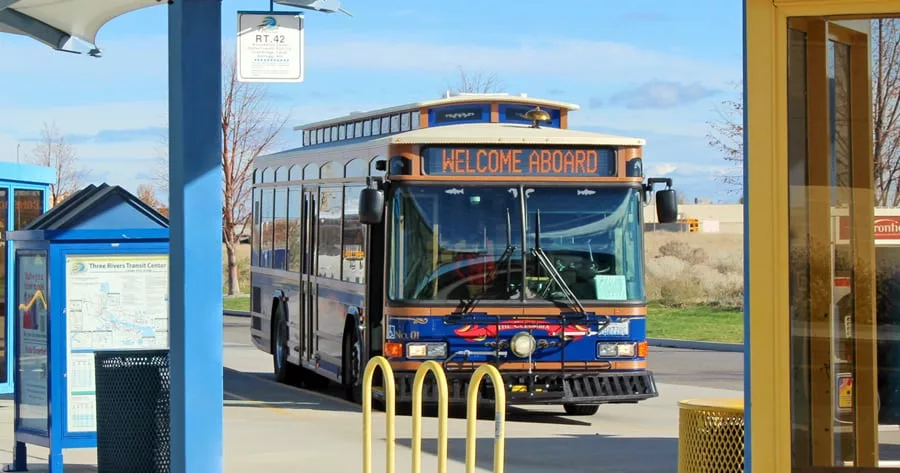
Home » Ben Franklin Transit debuts comprehensive service plan changes
Ben Franklin Transit debuts comprehensive service plan changes

October 12, 2017
Ben Franklin Transit has rolled out comprehensive service changes, including free Wi-Fi on buses and text alerts, more direct and frequent connections, and extended operating hours.
The changes were needed as the Tri-City area has grown and developed, said Daniel Elliott, marketing coordinator for Ben Franklin Transit.
“We realigned routes to be more direct. Now it’s easier to get from one city to another, because we realize that people who live in Richland, Kennewick, or Pasco don’t necessarily work there too,” he said.
The transit agency analyzed ridership data and travel patterns to see “where everybody was going and what the hotspots were,” Elliott said. “Using the data we collected, we were able to develop more direct routes that eventually lessened travel time among major corridors. You can get to your destination faster.”
The majority of the 17 fixed bus routes will run every 30 minutes instead of every hour, with the exception of busier corridors like Court Street in Pasco, Clearwater Avenue in Kennewick and George Washington Way in Richland, which will be 15 minutes each.
Routes 23 and 26 are now inter-city routes and their numbers have been changed to 123 and 126. Route 123 now connects Knight Street Transit Station to Three Rivers Transit Station by way of Keene Road. Route 126 now connects Knight Street Transit Station to Three Rivers Transit Station by way of Highway 240.
Ben Franklin Transit also eliminated five bus routes.
In 2016, BFT had 3.6 million boardings, but that number has been decreasing slightly throughout the years, said Kurt Workman, marketing and outreach manager for Ben Franklin Transit.
“This is something that a lot of public transportation districts are experiencing, and it’s tied to lower gas prices,” Workman said. “These changes also help address that.”
The transit agency spent $366,000 in initial startup costs for the service changes — which included things like printing signs, holding public meetings, hiring more drivers, overtime pay and hiring AECOM for transit planning consulting. The service changes will cost the agency an additional $3.2 million a year, which includes wages, maintenance, and wear and tear of transportation.
The transit is funded primarily from fares and sales tax revenue.
“What’s happened in the last few years is that the area has grown so fast and the economy has strengthened, and sales tax revenue increases,” Workman said. “It’s our duty to use those funds to put additional services on the road.”
The transit agency has expanded its service hours for fixed routes and Dial-A-Ride services. Now riders can use the bus from 6 a.m. to 8 p.m. during the week and 7 a.m. to 7 p.m. Saturday. “Riders can be more flexible with their time, allowing them to spend more time with their family and running their errands,” Elliott said.
Before the service change, the hours were 6 a.m. to 6 p.m. weekdays and 8 a.m. to 6 p.m. Saturday.
“Whether it’s grocery shopping or going to see friends, or people using the bus to do chores, riders will have more time to do that,” Elliott said. “We realize not everybody has a traditional 9 to 5 job. There are people that work non-traditional hours.”
Before going ahead with the service changes, Ben Franklin Transit held open houses to seek feedback on the proposed routes and other transportation feature requests. The first round of open houses was in January and a second round was in May.
The transit system also underwent a major technology upgrade. The new rider-friendly technology lets riders easily choose route options and bus stops, map walking distance, and check travel times depending on their departure and arrival location.
Riders also can sign up to receive text message alerts on routes and departure times, and watch real-time stats as the bus moves along its route toward stops.
“We wanted to be on par with the technology offerings of bigger transit systems,” Elliott said.
Part of that is via Myride.bft.org, a GPS-connected online route planner that allows riders to track the location and status of their bus.
“You can track your bus via GPS and it’ll tell you whether it’s running early or running late,” Elliott said. “We also made the sure the website was mobile compatible, making it easy to access the information when they’re on the go.”
Free Wi-Fi is now available on all 60 buses.
“We want to make sure people don’t have to pause their life when they’re on the bus. Then you can still be connected to people, browse social media and also allows people to do the Myride program while on the bus,” Elliott said.
Ben Franklin Transit also updated its website to make it easier for people to navigate. A trip planner option allows riders to view a Google Map of their ride, including stops and bus fares.
The regular adult fare is $1.50 per ride, or $25 for a monthly pass. Seniors and children 5 and younger are free.
Visit bft.org for more information on routes and bus fares.
Local News
KEYWORDS october 2017





